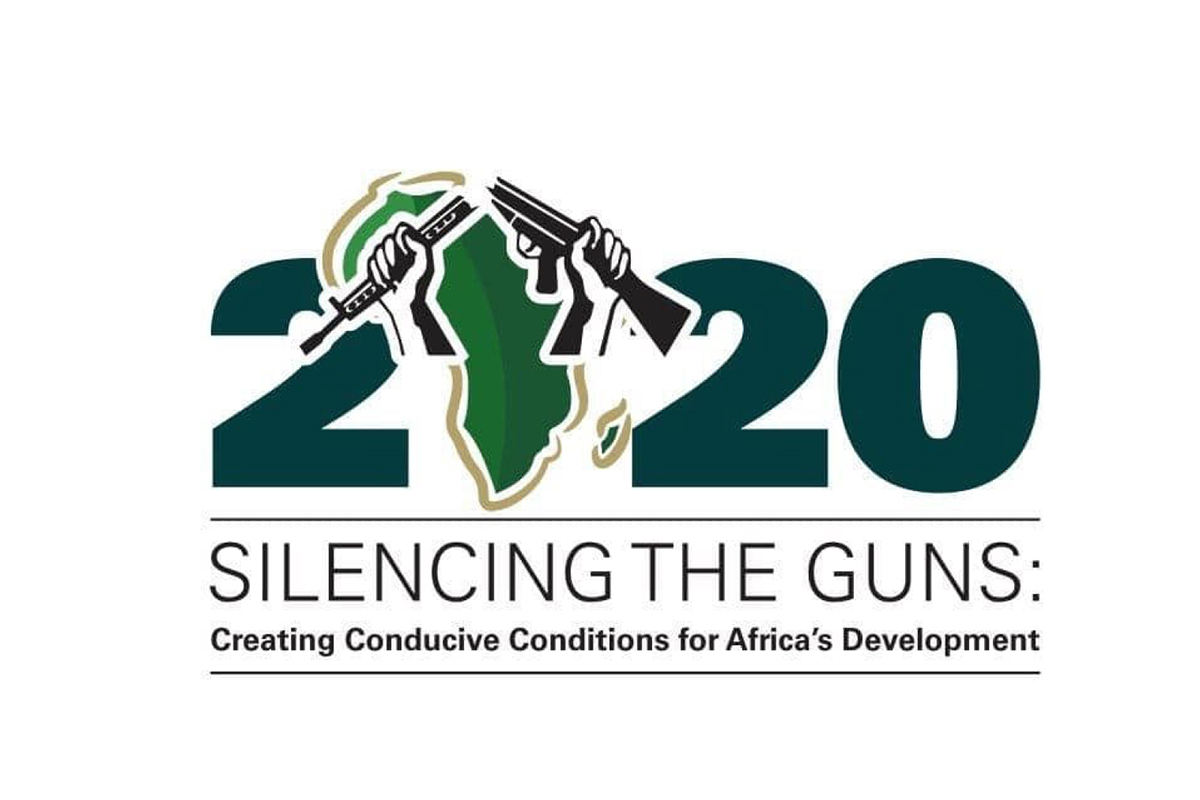In 2017, the Assembly of the African Union adopted the “African Union Master Roadmap of Practical Steps to Silencing the Guns in Africa by 2020”. The Silencing the Guns campaign is part of the broader vision of Agenda 2063 with the goal of achieving the ‘Africa We Want’. It aims to ensure a prosperous, integrated and peaceful Africa with inclusive and sustainable development. In 2020, as part of the practical steps, the African Union has kicked off the Silencing the Guns campaign, targeting its member states as they are the primary duty-bearers to ensure peace and security, and the realisation of human rights within their respective jurisdictions and beyond.
On 20 July 2020, students on the Human Rights and Democratisation in Africa (HRDA) programme at the Centre for Human Rights, University of Pretoria, hosted a webinar on the theme ‘The Relevance of AU’s Silencing the Guns campaign for the civil societies in Africa.’ The aim was to make visible the connections between the work of relevant civil society sectors in Africa and the AU’s Silencing the Guns campaign, in order to accelerate the mainstreaming of the campaign into civil society’s existing advocacy efforts.
Africa is one of, arguably the highest, continents experiencing prevalent conflicts. There are several causes of conflicts happening in many African countries. The major ones are often a result of the lack of equitable share from the natural resources, governance-related problems, and politicised identities. During the webinar, Mr Bright Sefah (Governance Analyst) clearly set out that most of the conflicts Africa are identity-based such as ethnic and religious groups. Sefah noted that there is an international dimension in intra-state conflicts in Africa and to succeed in silencing the guns, there is a need to invest more is addressing intra-state conflicts happening in different parts of the continent. This will require collaboration from all the stakeholders including the states, the African Union organs and civil societies across the continent. Mr Jeggan Grey-Johnson (Communications and Advocacy Coordinator, Open Society Foundations, Africa Regional Office) highlighted the incidence of conflicts happening across Africa and mentioned the possibility of recurrence. Some of the obstacles to silencing the guns include the lack of inclusive politics, inequalities to access basic social services, and military involvement in politics. Grey-Johnson stressed the need to foster inclusivity, deeper forms of accountability and the re-imagination of non-state actor engagement and contribution toward advancing regional and continental agendas.
In the endeavour to realise a conflict-free Africa, it is necessary to consider the gender dimension of the problems as well as the solutions. In the absence of such an approach, the efforts made so far will be a zero-sum game. Speaking on the need to effectively integrate the gender dimension into the Silencing the Guns campaign, Mx. Busisiwe Deyi (Commissioner, South African Commission for Gender Equality) raised the experience of South Africa and how failure to consider a gendered perspective in the process of disarmament can translate into perpetuating a gender-based violence post-conflict community. Busisiwe added that in the effort of advancing the Silencing the Guns campaign, civil society should work towards ensuring that existing systems and structures are legitimate and serve the interest of the people, including women, so that there will be no need resort to violent means to advance one’s cause of action.
The engagement of civil society organisations with the AU organs plays a significant role in enhancing the success of the Silencing the Guns effort. On the one hand, civil society organisations serve as watchdogs that oversee the extent to which countries comply with their commitment to international and regional human rights standards. On the other hand, civil societies support the government in preventing and resolving conflicts. Dr Japhet Biegon (Africa Regional Advocacy Coordinator, Amnesty International) emphasised that the interaction of civil societies with the African Governance Architecture (AGA), particularly with the Peace and Security Council (PSC), has to be enhanced so that civil societies across the continent can contribute more to strengthening peace and security on the continent. Biegon articulated the need to bridge the gap among civil societies working on human rights issues and those working on peace and security issues.
The presence of numerous civil societies in Africa, some working within one country and others on a regional level, provides ample opportunity for the citizenry as well as for governments. Collaborating with civil societies enables the states to utilise the rich expertise, experience and resources in attaining short and long term national and continental agendas. As one of the major regional priorities, the Silencing the Guns campaign is no exception. Civil societies are key allies in the African Union aspiration to prevent and resolve conflicts and to restore and maintain peace. Ensuring a conflict-free Africa is not only the homework of the African Union or its member states: it is the stake of all individuals and organisations living and working in Africa and beyond. Particularly, for the civil societies to work effectively, the African Union and its member states have to create a conducive environment and enhance their engagement. It is only when hands are put together that we will be able to achieve a conflict-free Africa, prevent genocide, make peace a reality for all and rid the continent of wars, violent conflicts, human rights violations, and humanitarian disasters.
The students developed a booklet titled A civil society guide to Silencing the Guns in Africa. Civil Society Guide to Silencing the Guns in Africa. This publication is an advocacy output of the Violence and Civil Society Group in partial fulfilment of the LLM/MPhil Programme in Human Rights and Democratisation in Africa. It is based on the webinar hosted by the group on “The Relevance of the AU’s Silencing the Guns Campaign for Civil Society” which was held on 20 July 2020. The contents are directly and primarily derived from or inspired by, the thoughtful presentations delivered by the speakers, Dr Japhet Biegon, Busisiwe Deyi, Jeggan Grey-Johnson and Bright Sefah, whom we thank for their wisdom, generosity in permitting us to produce this resource, as well as their guidance and support in making practical our academic learnings.
Organised and compiled by the Violence and Civil Society Group from the HRDA 2020 class:



